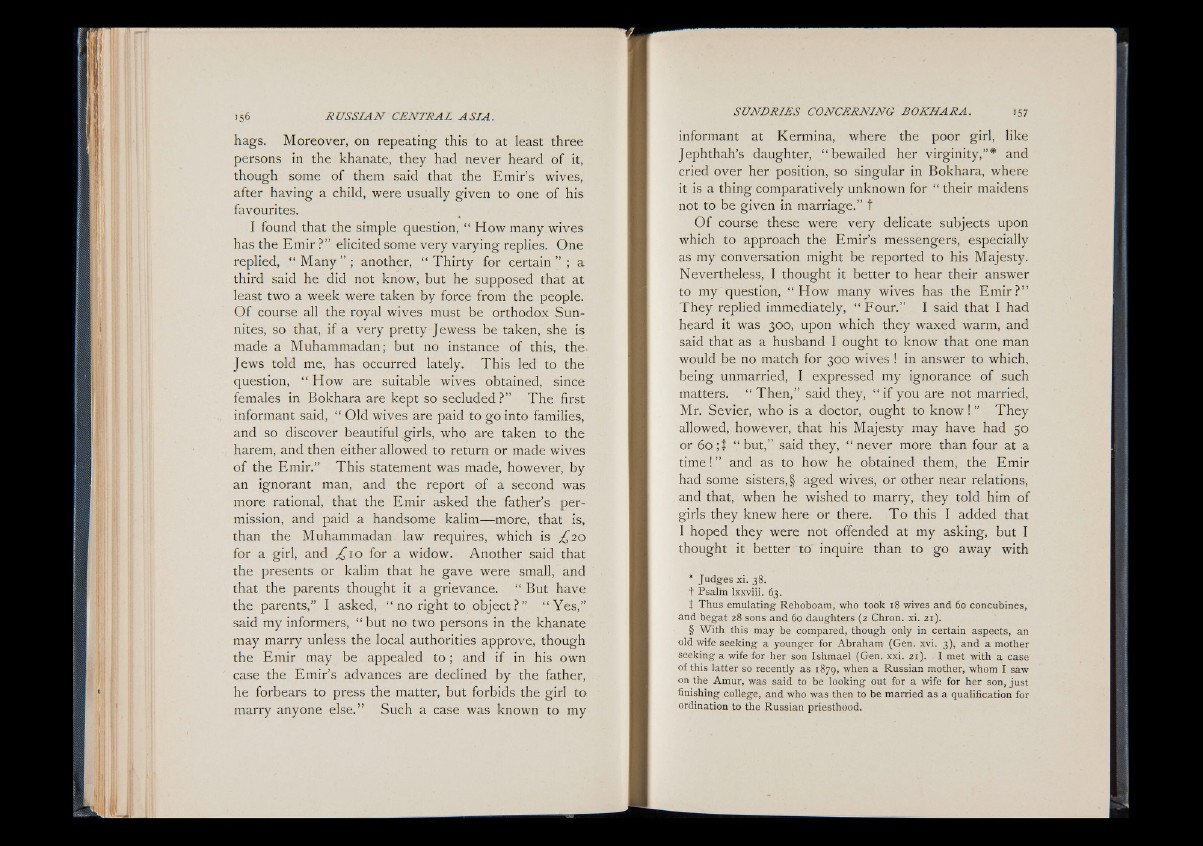
hags. Moreover, on repeating this to at least three
persons in the khanate, they had never heard of it,
though some of them said that the Emir’s wives,
after having a child, were usually given to one of his
favourites.
I found that the simple question, “ How many wives
has the Emir ?” elicited some very varying replies. One
replied, “ M an y ” ; another, “ Thirty for certain” ; a
third said he did not know, but he supposed that at
least two a week were taken by force from the people.
O f course all the royal wives must be orthodox Sunnites,
so that, if a very pretty Jewess be taken, she is
made a Muhammadan; but no instance of this, the.
Jews told me, has occurred lately. This led to the
question, “ How are suitable wives obtained, since
females in Bokhara are kept so secluded ?” The first
informant said, “ Old wives áre paid to go into families,
and so discover beautiful,girls, who are taken to the
harem, and then either allowed to return or made wives
of the Emir.” This statement was made, however, by
an ignorant man, and the report of a second was
more rational, that the Emir asked the father’s permission,
and paid a handsome kalim-B-more, that is,
than the Muhammadan law requires, which is £20
for a girl, and £ 10 for a widow. Another said that
the presents or kalim that he gave were small, and
that the parents thought it a grievance. “ But have
the parents,” I asked,—“ no right to object?” “ Yes,”
said my informers, “ but no two persons in the khanate
may marry unless the local authorities approve, though
the Emir may be appealed t o ; and if in his own
case the Emir’s advances are declined by the father,
he forbears to press the matter, but forbids the girl to
marry anyone else.” Such a case was known to my
informant at Kermina, where the poor girl, like
Jephthah’s daughter, “ bewailed her virginity,” * and
cried over her position, so singular in Bokhara, where
it is a thing comparatively unknown for “ their maidens
not to be given in marriage.” t
O f course these were very delicate subjects upon
which to approach the Emir’s messengers, especially
as my conversation might be reported to his Majesty.
Nevertheless, I thought it better to hear their answer
to my question, “ How many wives has the Em ir? ”
They replied immediately, “ Four.” I said that I had
heard it was 300, upon which they waxed warm, and
said that as a husband I ought to know that one man
would be no match for 300 wives ! in answer to which,
being unmarried, I expressed my ignorance of such
matters. “ Then,” said they, “ if you are not married,
Mr. Sevier, who is a doctor, ought to know ! ” They
allowed, however, that his Majesty may have had 50
or 60 ;i “ but,” said they, “ never more than four at a
time! ” and as to how he obtained them, the Emir
had some sisters, § aged wives, or other near relations,
and that, when he wished to marry, they told him of
girls they knew here or there. T o this I added that
I hoped they were not offended at my asking, but I
thought it better to inquire than to go away with
* Judges xi. 38.
t Psalm lxxviii. 63.
% Thus emulating Rehoboam, who took 18 wives and 60 concubines,
and begat 28 sons and 60 daughters (2 Chron. xi. 21).
§ With this may be compared, though only in certain aspects, an
old wife seeking a younger for Abraham (Gen. xvi. 3), and a mother
seeking a wife for her son Ishmael (Gen. xxi. 21). I met with a case
of this latter so recently as 1879, when a Russian mother, whom I saw
on the Amur, was said to be looking out for a wife for her son, just
finishing college, and who was then to be married as a qualification for
ordination to the Russian priesthood.